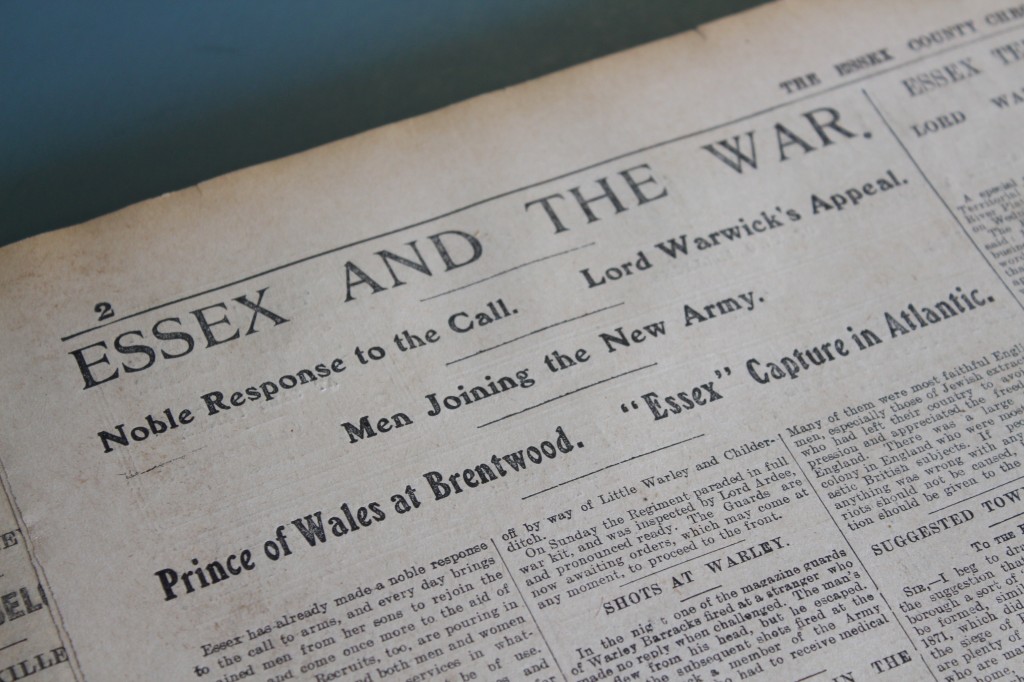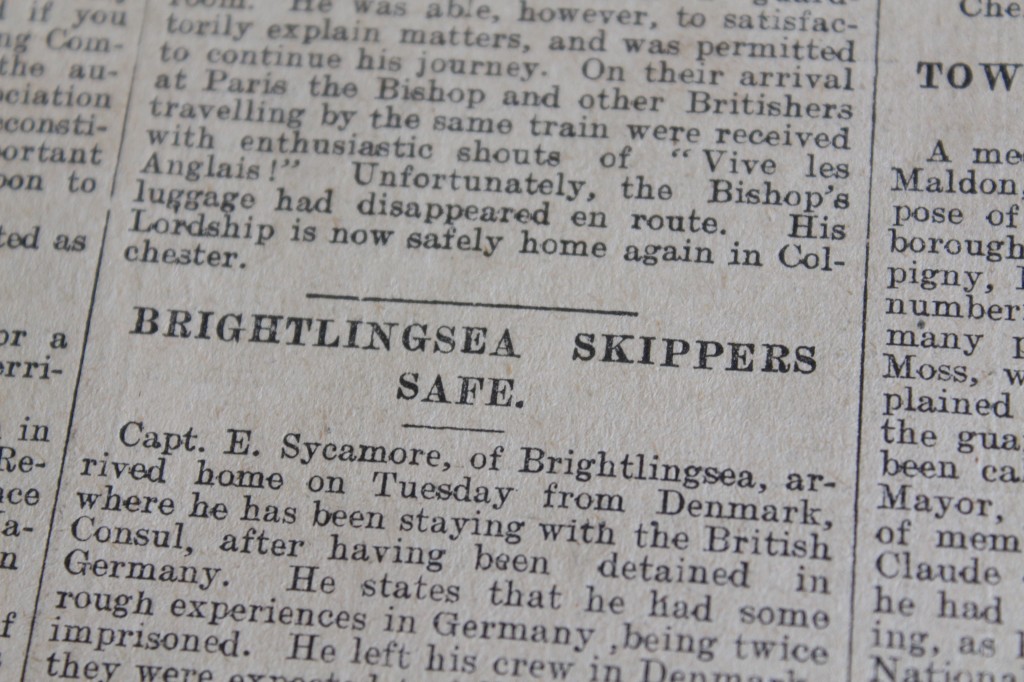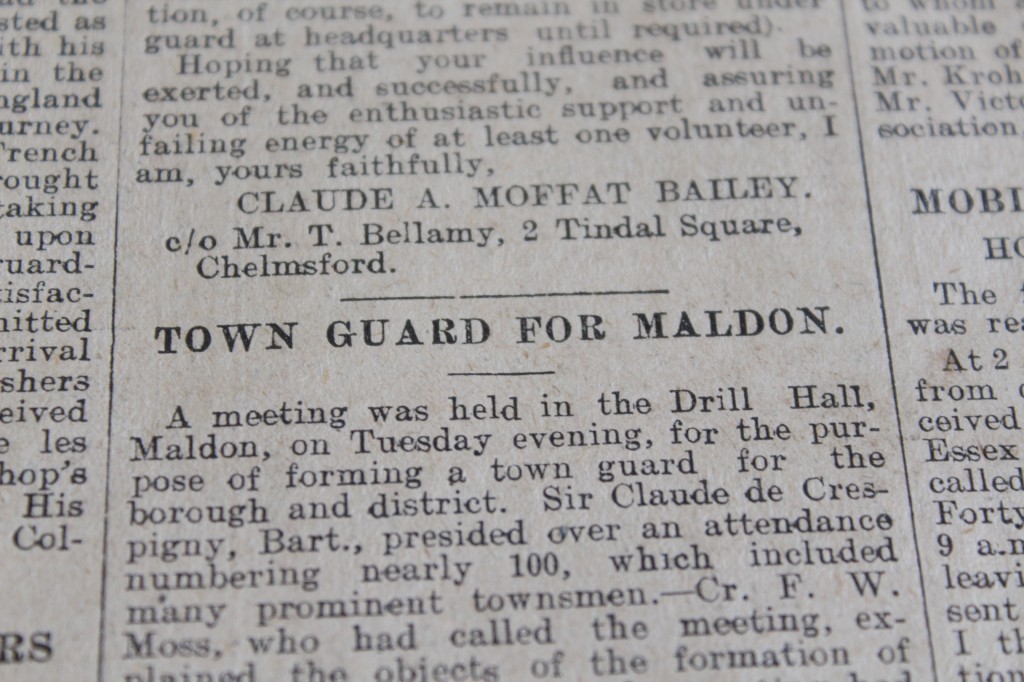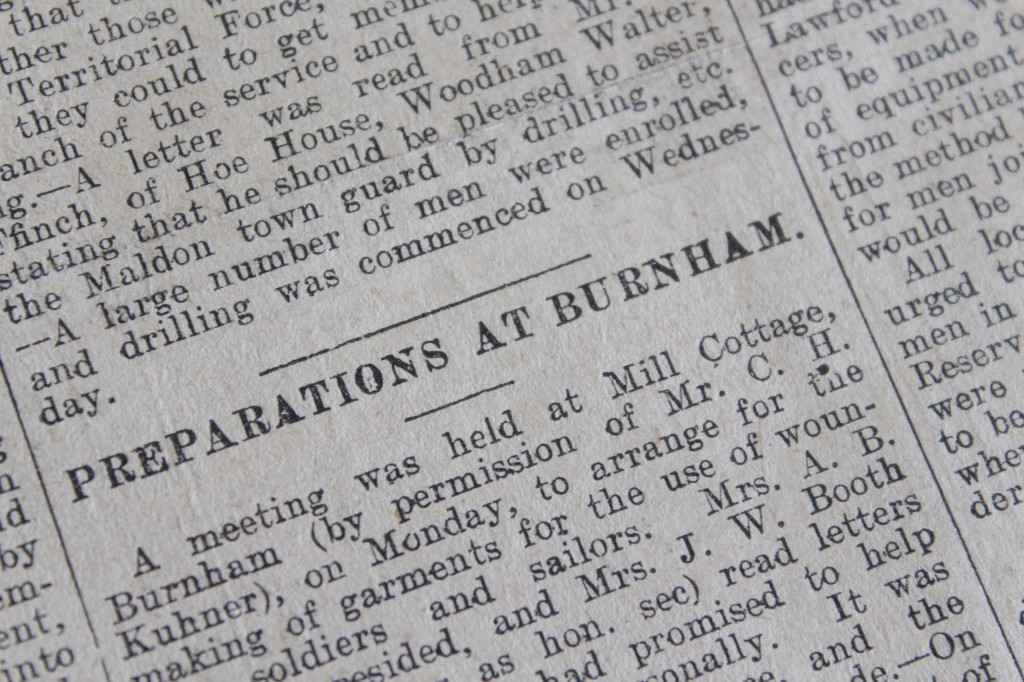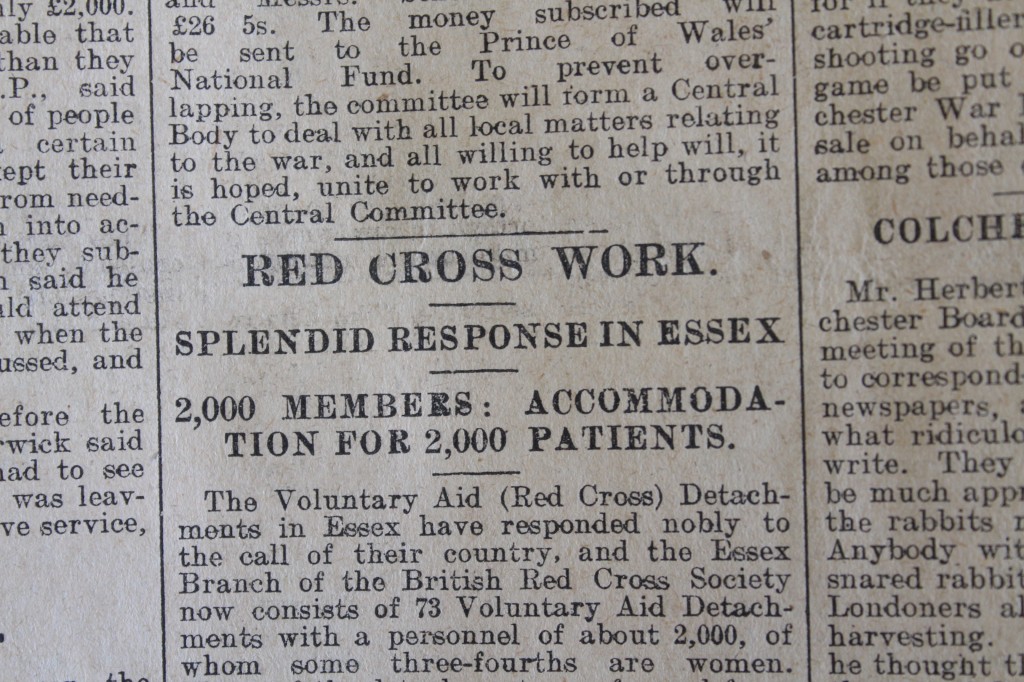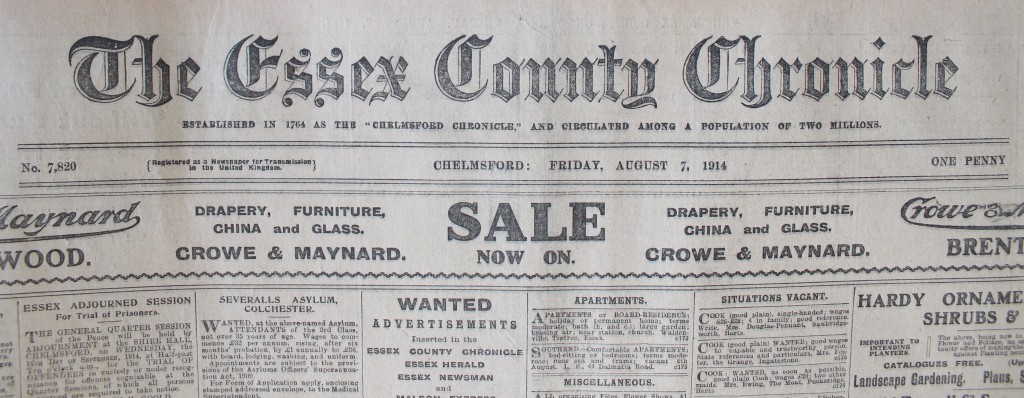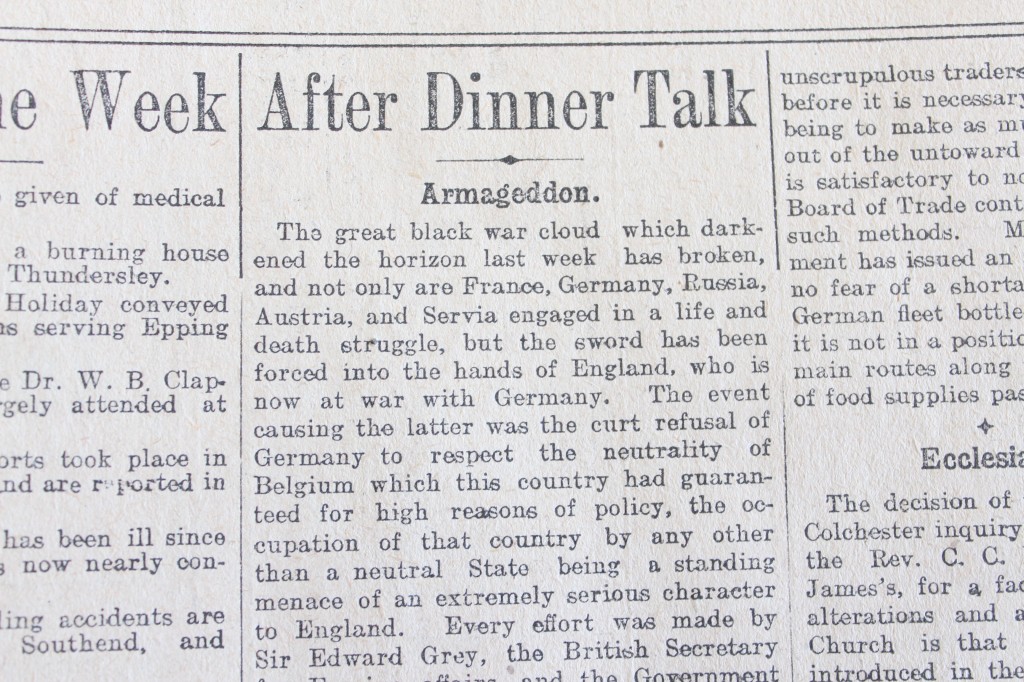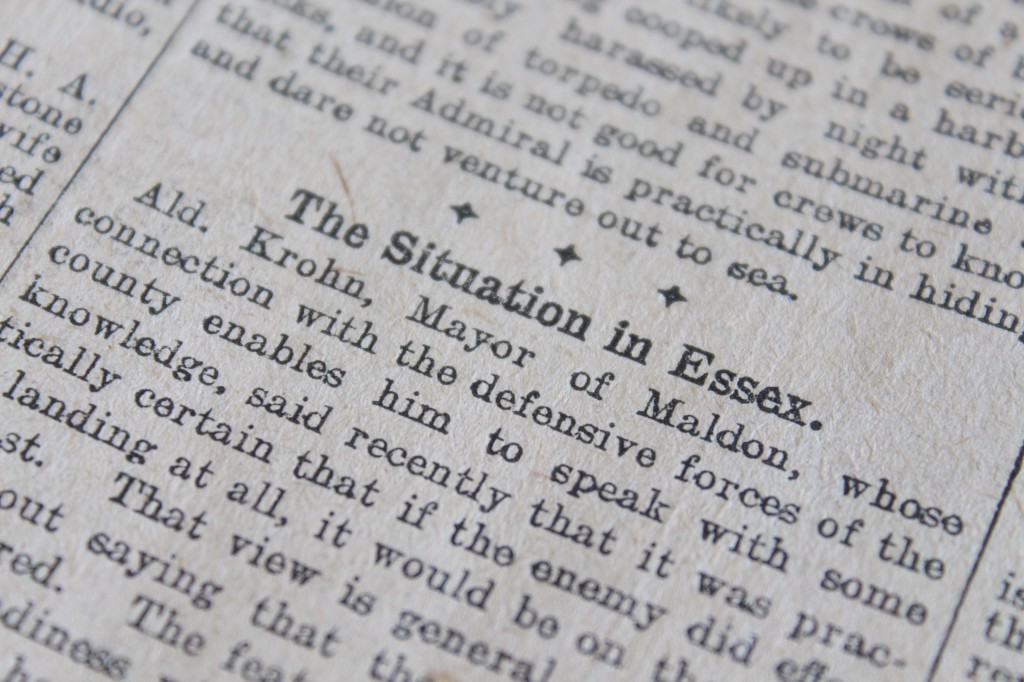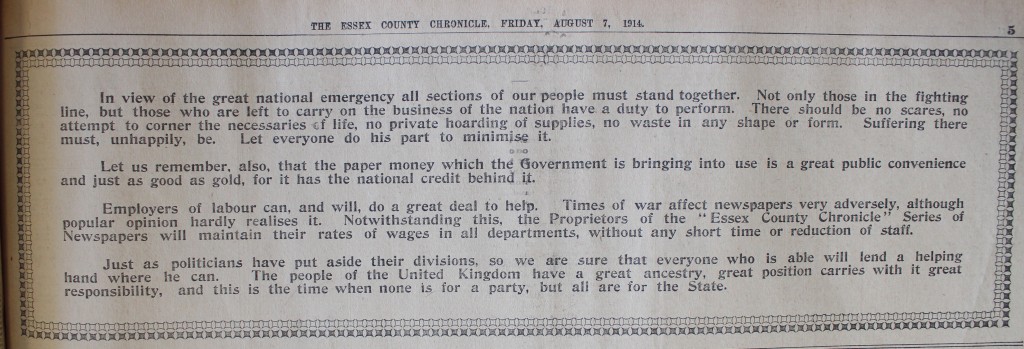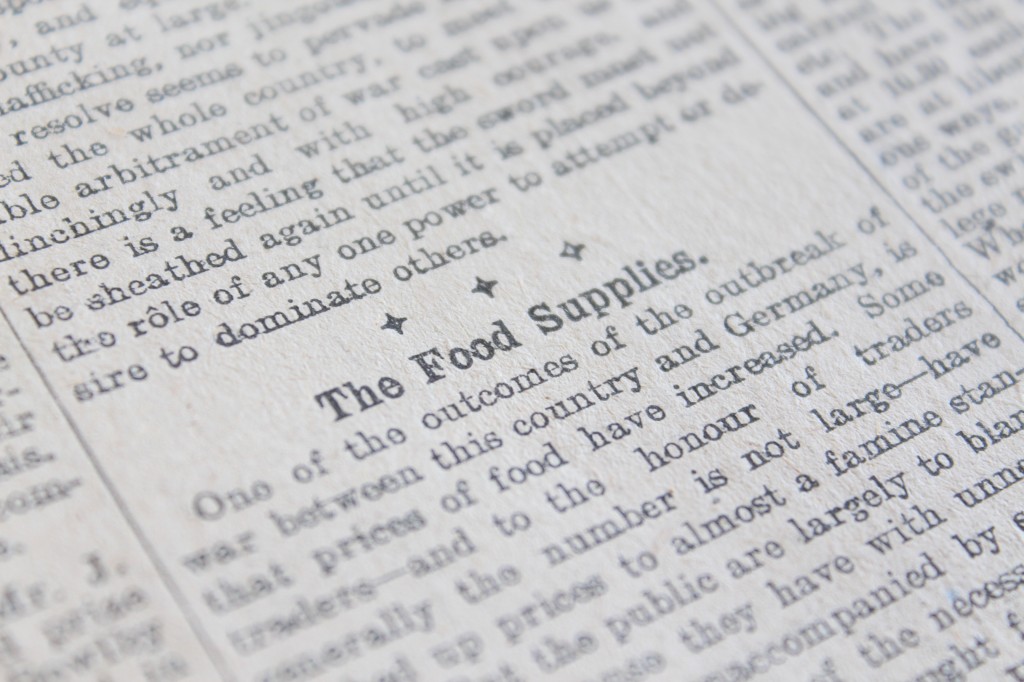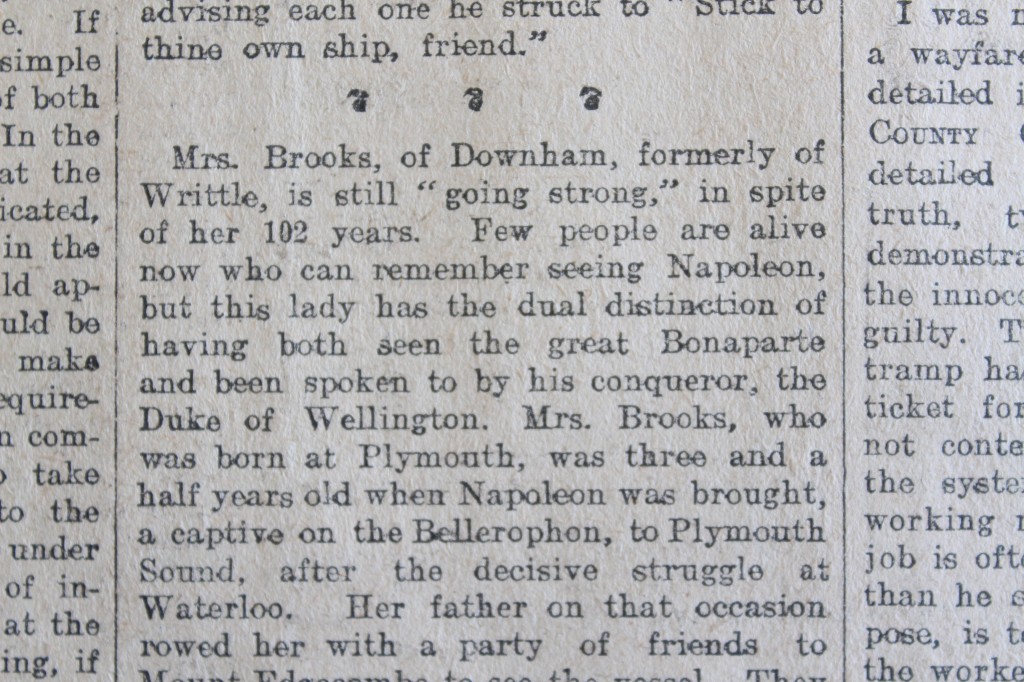Following our recent post on how the Essex County Chronicle reported on local responses to the outbreak of the First World War, today we take a look at a few of the stories published the following week on 14 August 1914.
These snippets from the Chronicle give us a bit of an insight into the sorts of things that people were talking about and doing as the world slid into chaos around them.
Joining up
The Chronicle reported that:
‘Essex has already made a noble response to the call to arms, and every day brings trained men from her sons to rejoin the colours and come once more to the aid of the Empire. Recruits, too, are pouring in at all the offices, and both men and women are volunteering their services in whatever capacity they can best be of use. There is no shirking. All classes and people of all creeds stand together’
Recruiting for Kitchener’s New Army had already begun, and it was reported that large numbers of Essex Territorials had already volunteered for it.
The Chronicle also reported on a special meeting of the Essex County Territorial Force Association that had taken place in Finsbury Circus, which was addressed by the Earl of Warwick:
‘I don’t want to depress you too much, but you all must know the terrible anxiety that must exist for a very long time to come. Two enormous armies are face to face – the largest in the history of the world. We have been brought into this conflict, peace loving people as we are, through no fault of our own. We have to try in every way to go through with it for the best interests of this glorious old country. Not only are you fighting for everything you love and cherish, for your hearths and homes, and sacrificing yourself in their interests, but you have got to remember that this war has got to be fought to a finish.’
A report on mobilisation read by the Secretary stated that the force had started to receive call ups for various sections on 30th and 31st July and that ‘in the county of Essex they had been as prompt as any other county in England. All the Territorial Battalions were now mobilised’. They had been 1100 under strength, but all vacancies had been filled.
Paranoia sets in
One story reported on 14th August suggests that parts of the county at least were on edge, and a tragedy was narrowly averted at Warley Barracks:
‘In the night one of the magazine guards of Warley Barracks fired at a stranger who made no reply when challenged. The man’s hat flew from his head, but he escaped. One of the subsequent shots fired at the fugitive struck a member of the Army Medical Corps, who had to receive medical attention.’
A young man visiting Harwich meanwhile had filled some time by sketching on the pier: ‘He was promptly arrested by the military sentries on duty, and taken to the Redoubt. After detention for two hours he was released’. His story was presented as a warning to others.
Anti-German feeling was also quick to set in amongst some people, as is shown in this story from a hearing in Stratford:
‘At Stratford on Saturday, in binding over James Webster, 42, a labourer, of Buckhurst Hill, who was stated to have been engaged in an argument with an Englishman, whom he accused of being a German. Mr Ehot Howard said he hoped Englishmen would not annoy persons simply because they bore German names. Many of them were most faithful Englishmen, especially those of Jewish extraction, who had left their country to avoid oppression and appreciated the freedom of England. There was a large German colony in England who were most enthusiastic British subjects.’
Essex people trapped abroad
Some Essex residents had been in Europe when the war broke out, and some ran into trouble before they managed to make it home.
The Bishop of Colchester had been on holiday, and was arrested in France as a spy for snapping a photograph. The Chronicle reported that he was ‘pounced upon by the military and taken to a guardroom’, but after explaining managed to make it safely back to Colchester.
There had, meanwhile, been more anxiety in Brightlingsea. Several local men who had been at sea working on racing yachts had been held by the Germans. One man had returned home but others were still on the continent:
‘Capt. E. Sycamore, of Brightlingsea, arrived home on Tuesday from Denmark, where he has been staying with the British Consul, after having been detained in Germany. He states that he had some rough experiences in Germany, being twice imprisoned. He left his crew in Denmark; they were expected to follow on. Captain Sycamore arrived with nothing beyond the clothes he was wearing, all his other luggage having been taken from him while in Germany. Capt. Sycamore brought a reassuring message with regard to Captain James Taylor, of Brightlingsea, who, with his wife, is imprisoned at Hamburg.’
County defences
People had already begun to mobilise to prepare to defend their county. In Maldon, for example, a meeting had been held at the Drill Hall to form a town guard for the borough and district. The guard was for men too old to join the Territorials who wanted to play a part in defending their homes. Nearly 100 people were reported to have attended, and apparently a large number of men enrolled and began to drill almost immediately.
Unemployment and poverty
Across the county, local leaders had received telegrams from the Prince of Wales asking them to assist in the setting up of local branches of the National Relief Fund.
As mentioned in our post on August’s document of the month, unemployment and poverty were rapid consequences of the outbreak of war. Cllr Booth, Vice-Chairman of Burnham Council, said at a specially-called meeting to consider the local consequences of the war:
‘it would be necessary to form a relief committee, and that was his chief object in asking for the meeting. There was likely to be much poverty in consequence of the war, and they ought to make provision for this. He suggested that, with a view of providing employment, this would be a good time to proceed with the sewerage scheme. They were all agreed that this was necessary, and perhaps they might get assistance in carrying it out. He knew it would be expensive to borrow money at this time, but they ought to do what they could to provide employment.’
Local employment already being affected; the Mildmay Ironworks had had orders for piano frames cancelled, and the oyster trade was likely to have a bad winter. The council agreed to ask the Surveyor what useful and necessary works the Council could do to provide employment, and Mr Booth also proposed formation of a Relief Committee.
Preparations for the wounded
Local people quickly began to prepare to aid the expected numbers of wounded. In Burnham, a meeting was held at Mill Cottage to make arrange making clothes for wounded servicemen. The group who met had already received offers of help, both financial and personal. A series of first-aid lectures had also begun, and arrangements had been made to open two or three hospitals as temporary schools in the expectation that the wounded from naval engagements might be brought to the area.
There was also a report on local Red Cross work. The Essex Branch of the British Red Cross was reported to consist of 73 Voluntary Aid Detachments, with a total personnel of about 2,000, three quarters of them women.
People had also been quick to volunteer buildings to be used as hospitals:
‘Since the commencement of the war many generous offers of private houses, institutions, and other buildings for use either as hospitals or convalescent homes have been made, and in many instances steps have been taken to equip some of these buildings at short notice.’
These buildings included Easton Lodge, Dunmow, Hylands House, Widford, Birch Hall, Theydon Bois and Sewardstone Lodge, Waltham Abbey. Many schools and other public buildings had also been identified as possible hospital sites.
The Palace Hotel in Southend, for example, had already been set aside for use as a naval hospital, to be known as Queen Mary’s Royal Naval Hospital, with accommodation for at least 400 patients.
There was to be much, much more published in local papers on the war and the impact it was having locally over the coming months and years, and they make fascinating reading. If you would like to see for yourself, the ERO has some local newspapers available on microfilm, or you can visit ERO or any Essex library to use the British Newspaper Archive online for free.
All images reproduced courtesy of the Essex Chronicle
To find out more about First World War records at ERO, join us at the following:
A Righteous Conflict: Essex people interpret the Great War – A talk for the Essex History Group by Paul Rusiecki, Tuesday 2 September, 10.30am-11.30am, free, no need to book
Essex at War, 1914-1918, a day of events at Hylands House, Sunday 14 September (details here)

